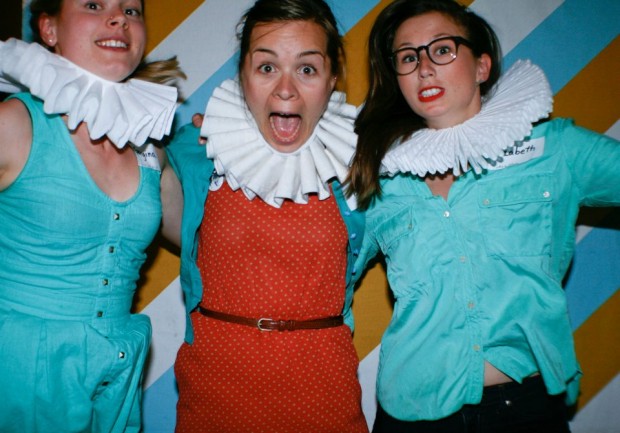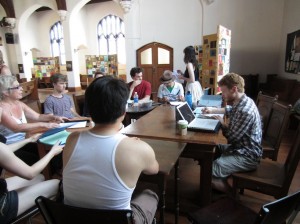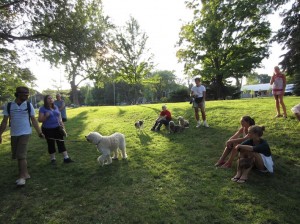
Ruff volunteers (l-r) Georgina Beaty, Molly Gardener, and Elizabeth McManus
by Brendan Howlett
I grew up in the Riverdale neighbourhood on the east side of the Don Valley River. Back when I was a kid, Riverdale and Leslieville were not the burgeoning hot spots they are today. In fact it was a bit of a cultural void. Even today you’ll be hard pressed to get anyone to cross the unaccountably ominous Don Valley in either direction.
A rare source of local high art was a humble little outfit called Shakespeare in the Rough. An outdoor theatre company started under a pair of hundred-year-old trees in the heart of the Riverdale neighbourhood – Withrow Park. At their inception they took the name “ROUGH” to heart – no lights, no microphones, and a bare minimum of costumes. With little more than Shakespeare’s powerful language, they transformed that park into kingdoms and courts, battlefields and deserts, the worlds they created, uncontained by the walls of a theatre spilling out on all sides of the audience making you feel dangerously engulfed in Roman politics or English rebellions.
It was these productions of Shakespeare that I was weaned on. The productions in Withrow Park became a yearly tradition for my mother and I – making the 5 min hike up the hill with our raggedy, thread-bare lawn chairs, watching a particularly violent yet bloodless production of Titus Andronicus… heading to the Danforth for a mint chocolate-chip ice cream.

First day
Under the Artistic Direction of Kevin Hammond and Sanjay Talwar who took the helm for what turned out to be its final 5 years, the company blossomed into a widely respected Shakespeare company renowned for their lively productions and bare bones aesthetic. It became the unofficial training grounds for young actors, directors, and designers to cut their teeth on the complex world of Shakespeare.
Many of the artists who worked for that original company quickly ended up at the festivals of Shaw and Stratford – including Stratford Associate Artistic Director Dean Gabourie (Interview with Dean Gabourie about Two Gents – ) who took some of the ideas he developed while directing The Two Gentlemen of Verona for Shakespeare in the Rough to his Stratford production in 2010.
Unfortunately, in 2006, that original company gave its last performance – a production of Antony and Cleopatra. For any theatre company in Toronto that’s been built on blood sweat and tears, one poorly timed bump in the road can spell the collapse of a seemingly well-established company; as was the case with Shakespeare in the Rough. During their process of handing over the reins to a new artistic director, the delicate ecosystem of board members, artists, and fundraising, hit one of those little bumps, and before anyone knew what was happening, the organization evaporated. And this was not an isolated incident for Shakespeare companies at that time – in the span of one year, the GTA area lost not only the original Rough company, but also ShakespeareWorks and The Oakville Festival of Classics.
Thirteen years of hard work and development disappeared over night. I believe the biggest loss was suffered by those of us in the surrounding neighbourhoods of Riverdale and Leslieville, who had come to rely on Shakespeare in the Rough not only as a staple of our summer traditions, but also as the most accessible, welcoming, yet high-quality theatre available to us. Seeing the shows every summer as I became more and more involved in theatre as a pimply highschool kid and bourgeoning Shakespeare geek, I always had the fantasy of performing with this company in my own backyard. But the company closed down a just before I finally graduated theatre school and moved back home.
Eventually I sat down with a bunch of young theatre artist friends and pitched them the idea – resurrect an old company, away from the hip downtown theatre scene, with a stripped-down aesthetic and a focus on serving the community where we were putting down roots. A very personal project on my part, we would be performing 100 meters from where I had my first kiss. A fact that, much to my humiliation, made it into our promotional video, which I still can’t watch without blushing. We put a twist on the name – Shakespeare in the RUFF – and set about building the new company on the foundations left by the old.
It’s no secret that across the national theatre community the major topic of conversation is how do we get new audiences to see theatre. This issue bubbled up with the closing of the Vancouver Playhouse, and I believe that it’s also at the core of the
lively debate on praxistheatre.com regarding the fate of Factory Theatre. A younger generation is looking at the theatre scene and seeing that there isn’t necessarily a place for them in the older institutions (I can’t believe that I’m considering companies founded in the 70’s as ‘older institutions’), nor do the younger generation necessarily want that place along with the millstones of full season programming, competitive and unending cycles of grant writing, increasing debt, and fickle audience numbers.
We speak of new models for theatre creation, but perhaps we don’t really need new models but rather simpler models that are able to adjust to an ever-changing cultural and financial landscape in this city.
This company is our attempt at exploring a more basic model for our work. At the very core of this company’s ideals is the idea that we as artists must serve and be nourished by a specific community. We receive no government funding, but we reached our modest budget goals through micro-fundraisers we’ve been calling “Serving Shakespeare”. These salon type events are our attempt at avoiding the dreaded “pass the $20 bill” fundraisers where our theatre community shuffles around our resources from one project to the next without bringing any new money into the picture.

Doggie auditions!
Help came from the neighbourhood through community organizations like Friends of Withrow Park and the local Farmer’s Market, through local businesses that provided space or food like Broadview Espresso and Combine Eatery. We’re also sourcing our canine performer (yes there is a real dog in Two Gents!) from the local dog walking association of neighbourhood owners.
We perform and rehearse in the park, which without fail attracts a small gathering of people who watch us building our work right out in the open. Rooted in this one area, we’ve been able to maintain a presence in the community in the months and weeks leading up to our performances.
Concurrent with the show, we are running two community-based initiatives: The Guerilla Ruffians, a marauding band of amazingly talented current students or recent grads of theatre programs that have been attending workshops with established professionals to create a mobile performance troupe that appears at local events. Our other initiative is an Intensive Youth Apprenticeship Program offered free to neighbourhood high school students. Over six weeks the students sit in on rehearsals, take part in workshops led by members of the company, and create their own short play to be performed as an opening act on our closing weekend of performances.
There is a pervasive sense of recklessness that we’ve cultivated among our company – a sense that nothing is sacred or precious. For our inaugural production we’ve taken Shakespeare’s least produced play, The Two Gentlemen of Verona and re-wrote the ending. Albeit using all of Shakespeare’s text, stealing sections from all of his other plays and sonnets. I expect that we’ll offend some Shakespeare purists out there, and we’re looking forward to any debate we can spark about the sacredness of a text vs. responding to our current surroundings. There are already
some passionate views out there against mucking about with the classics.
Our challenge moving forward will be to constantly renew what it means to be artistically reckless; to follow our curiosity when it comes to looking forward to another season, rather than to try to give the audience more of the same each year, even if what we do is a raging success. I believe our hope for any kind of ‘success’ will lie in our investment in the youth apprenticeship program as well as the young emerging professional artists that are hungry for challenging work in this beautiful city. I hope that we can build this company into something the entire theatre community can take ownership over, invest in and benefit from in addition to empowering own artistic development.
]]>


